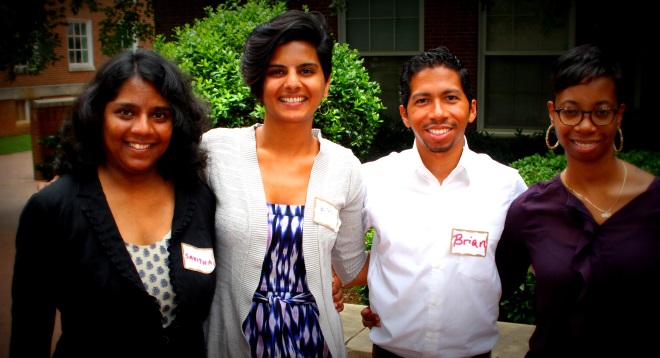EDF Climate Corps fellow | September 25, 2013
By: Savitha Sridharan
Historically Black Colleges and Universities (HBCUs) face a set of issues similar to other higher education institutions in the US. The majority of campuses must address persistent shortfalls in funding that delay needed capital expenditures and hinder the accomplishment of their missions. Under such frugal conditions, it becomes far more important to make use of available resources more efficiently. Energy efficiency is definitely one of them. Collaborative thinking, creative innovation and focused leadership are key elements that are helping HBCUs to become centers of sustainability.
The United Negro College Fund (UNCF)’s Building Green Initiative at HBCUs and Minority-Serving Institutions (MSIs) has officially moved to Clark Atlanta University (CAU) and will continue working to transform 20th-century campus infrastructures into living, learning laboratories that promote academic excellence and technological solutions needed to address complex social, economic and environmental problems. Under the leadership of Felicia Davis, Building Green Program
Director, the initiative has tapped multiple organizations to expand their MSI focused sustainability activities, including the resources available through the EDF Climate Corps program.
For instance, a grant from the Wells Fargo Foundation provided support for the placement of EDF Climate Corps fellows on several HBCU campuses, including my assignment at Clark Atlanta University. This opportunity allowed me to work directly with the Building Green Initiative in addition to identifying energy savings for the institution.
EDF has played an active role in helping to advance energy management practices at Clark Atlanta University. This is the second time the school has tapped the talents of an EDF Climate Corp fellow to improve energy efficiency at CAU. Under the supervision of CAU's principal investigator, Dr. Olu Olatidoye, my focus this summer has been to build an energy management decision tool for the school’s Thomas Cole Research Center of Science and Technology. The tool is a centralized database that consists of energy audit information, utility bills, rebates and tax incentives, a financial analysis calculator and an inventory of all devices that consume electricity on campus.
The energy management decision tool will help faculty navigate and utilize energy data and information and guide leaders in making recommendations. The tool also will help faculty easily identify cost-savings to cushion funding for the research center’s energy efficiency projects.
Contributing to CAU’s energy management planning has been a fulfilling professional experience, so you can imagine how excited I was to participate in the larger Building Green Initiative planning workshop, held at CAU in July.
The Building Green Initiative (BGI) is currently in the strategic planning process and building out the next phase of its development. The planning workshop refined program goals, objectives and major strategies. EDF Climate Corp staff and Brian Cabezas, another EDF Climate Corps fellow servicing an MSI this summer, traveled down to Atlanta to participate in the BGI planning workshop.
During this meeting, EDF’s Virtuous Cycle of Organizational Energy Efficiency gained a lot of attention. In an optimized organization, all five components of the “Virtuous Cycle” function at full capacity, enabling organizations to improve energy performance, and generate maximum financial and environmental returns. The group referenced the cycle in the development of four main goals that were identified at the meeting, including reducing carbon emissions on HBCU and MSI campuses and pinpointing a focus on strengthening organizational infrastructure, financial resources, partnerships and networks to further advance the initiative. To take things a step further, the group established four focus groups to help kick the BGI goals into gear. The focus groups will look into the development of student-run green ambassador programs, green revolving loan funds, marketing green initiatives and energy efficiency retrofit programs.
As Clark Atlanta and the Building Green initiative continue to move forward, I’m glad to have helped to shape the initial resources that will work to sustain their energy efficiency efforts and work towards becoming centers of sustainability.

Photo Caption: Savitha Sridharan, 2nd Year MBA Candidate 2014 from Olin Graduate School of Business - EDF Climate Corps Fellow at Clark Atlanta University; Sitar Mody, Senior Manager (Strategy) at EDF Climate Corps; Brian Cabezas, International MBA Candidate 2013 from IE Business School - EDF Climate Corps Fellow at South Carolina State University; Chaprece Henry – Program Coordinator at EDF Climate Corps
About EDF Climate Corps
EDF Climate Corps (edfclimatecorps.org) taps the talents of tomorrow’s leaders to save energy, money and the environment by placing specially-trained EDF fellows in companies, cities and universities as dedicated energy problem solvers. Working with hundreds of leading organizations, EDF Climate Corps has found an average of $1 million in energy savings for each participant. For more information, visit edfclimatecorps.org. Read our blog at edfclimatecorps.org/blog. Follow us on Twitter attwitter.com/edfbiz and on Facebook at facebook.com/EDFClimateCorps.